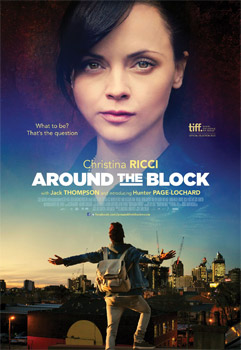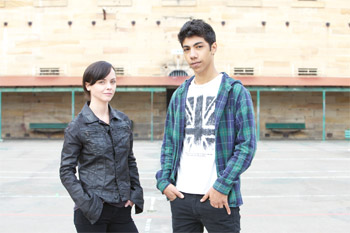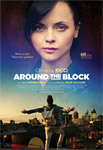Brian Rosen and Su Armstrong Around The Block

Brian Rosen and Su Armstrong Around The Block
Cast: Christina Ricci, Hunter Page Lochard, Jack Thompson
Director: Sarah Spillane
Genre: Drama
Running Time: 104 minutes
Synopsis: Around The Block is a story about American Dino Chalmers – an edgy and charismatic drama teacher with a passion for Shakespeare. When the opportunity arises for her to work at a school in inner Sydney, she embraces the chance to introduce the magical world of theatre as an alternative to life on the tough streets of Redfern, Sydney, Australia.
On arrival at Redfern High School, Chalmers finds her drama class of sixteen year olds to be a melting pot of nationalities – white, Aboriginal, Maori, Lebanese, etc. As she entices a core group to join her class, her attention becomes focused on Liam, a young part-Aboriginal boy.
Although Liam's family enjoys a strong profile in the city's underworld, (his father, Jack Wood, being recently imprisoned for twenty years and his brother, Steve, eager to get a revenge hit on the man who put him there) Liam has other aspirations and develops a fascination with the theatre. After Chalmers encourages Liam to audition for the school play he wins the lead role of Hamlet and is introduced to the world of acting. As he studies the play, Chalmers shows him the parallels that emerge between his own life and the life of his character Hamlet.
While the rehearsals take place, Steve develops plans for the hit. Liam feels great pressure as he is torn between duty (family obligations) and passion (the play) and his angst and confusion is noticed by Chalmers. Chalmers however has her own crisis at hand, as an encounter with an old friend leads her to question her sexuality, and thereby her imminent marriage to long-term boyfriend Simon.
Chalmers tests the boundaries of her personal relationship as Liam's turmoil peaks and the hit finally takes place, which Liam almost ruins, in an attempt to save the target's daughter from witnessing her father's murder. The deed done, Liam is dragged from the crime scene by Steve and his accomplice, Jason.
As the boys drive away from the execution scene Liam jumps from the car and runs off in to the surrounding bush land until he can run no further.
At this point Liam hits rock bottom psychologically and emotionally. In a spiritual moment as he sits on the cliff edge, he finds a connection with the land and reaffirms his Aboriginal identity. It is his moment – -to be or not to be'.
Around The Block
Release Date: June, 2014
 Interview with Brian Rosen
Interview with Brian Rosen
Around The Block, to me is a story of hope. It's about a young boy at risk who is given a choice in his life that a lot of young people in that situation aren't given and he grasps that choice and runs with it.
When did you first meet Sarah?
Brian Rosen: Normally in a movie it takes years and years and years to get a film made and for Sarah Spillane it has taken many years. For Su Armstrong and myself, it probably happened two years ago. I was totally smitten by Sarah Spillane's charismatic and charming manipulative way and at the end of it I really believed in what she was pitching me and the story she was telling me, even though with all the inherent problems that might be in a story that's an Indigenous story, a young kid in trouble, Hamlet and doing a play – all of these elements made it a hard film to get financed.
What was it like working with Sarah as a director.
Brian Rosen: Sarah Spillane is quite an amazing young woman she has a lot of attributes of a director that are fantastic. The thing that's impressed me most with her is, what a strong vision she's had for this project. What is amazing is how she has been able to maintain that vision and not compromise that much. She's made compromises, but not creative compromises.
There are some parallels in the story between Hamlet and the actual story of Around The Block. How would you describe some of the tragic elements in this film?
If you could pull out one of your favourite and most memorable scenes and talk about it?
Brian Rosen: The scene where Liam gives the letter to his father in jail as saying this letter is written, it's an invitation to come to the play, even though I know you can't. And within that letter it says 'I'm not going to be like you". Very powerful.
Why is this an important story to tell?
Brian Rosen: What the wonderful thing of this film is, is it shows a young Indigenous boy not blaming the past, but grasping at an opportunity to move to the future and that's what I think has to happen here.
I think what is important is this is a very universal story. This is no different than East LA, this is no different than the slums of Sao Paulo or Rio Di Janeiro or anywhere in the world, where you have people who are looking for self determination and I think that's what this story is and I think that's why it's an important story.
Why has Jack Thompson been such a champion of this film?
Brian Rosen: Jack Thompson has a great affinity to the Indigenous people and has had for decades. Jack Thompson is one of our great actors that gives to younger actors and especially to the Indigenous community of actors. He's promoted this film and has really put his belief behind Sarah.
So you've had to work pretty closely with the Aboriginal community in getting this film made. How has that benefited the film?
Interview with Su Armstrong
The story is about choice. Having the ability and knowledge to see that there are choices to be made and the courage to take them. The teaching of that by way of experience of other people to guide you in that direction.
It's a predictable story in a sense that a teacher comes to a hard-core school and is instrumental in guiding one of the children into having an opportunity in life, to break the cycle of crime that the family seem to be suffering, circling though and to be able to move away from that.
When did you first meet Sarah?
Su Armstrong: I met Sarah Spillane in Los Angeles in October 2010. After Brian and I talked about it, I'd read the script and I felt that there was something very interesting. It may be a predictable story but it's done with a difference, which is interesting in this day and age.
How has it been watching Sarah as a director?
Su Armstrong: I think she's amazing and there's something very special about the story. Her DNA is all over it as I would say. I can't imagine anyone else even contemplating being able to direct it. I think she's handled it extremely well. It's a tight schedule and here we are at the end and I think we've pretty much achieved it.
How is this story unique to the other films that have come out of Australia that are about indigenous youth?
Su Armstrong: I think a lot of films of Indigenous youth have played or shown the history of the Indigenous peoples but not where they stand in the modern world and in the centre of Sydney as youth. I think we're different because this could be anywhere. I think it could be in the East End of London, it could be in East LA it could be in the ghetto society of any large city where there's a minority demographic really.
This is Hunter Page Lochard's first big role and you've gotten to see a lot of his performances whilst filming this. What sort of passion has he had for the role?
Su Armstrong: I think Hunter Page Lochard's an extraordinary young man, he has embraced the role and he obviously desperately wanted it. During a read through for a scene where Liam gets angry and he stumbles over his lines, Hunter Page Lochard breaks down and he walks away. I thought he hadn't learnt the script well enough, until I realised it was the script. It was very powerful indeed and to have seen his emotions range from the light humour to the angst, the inner torment and the family torment, the love for his brother, the love for his father and mother through thick and thin. I just think it's amazing and I hope what we have seen through the camera is going to come out on screen. I really do because I think it deserves to.
One of the other big roles is played by Christina Ricci. How has her performance been against Liam's and their relationship – their evolving together?
Su Armstrong: I think Christina Ricci is a fantastic actress. She's embraced the role beautifully. It is a role of a fish out of water coming to this strange land and not having the preconceived notions about the personalities of the city and she's really been the perfect foil for Hunter Page Lochard or Liam's performance as well.
He's new, fresh and she's talented and professional and I think there's a great balance there. What are some of the tragic elements of Around the Block?
Su Armstrong: Well I think it's the hot headedness of some of the youth who have the idealisation of father that doesn't bear fruit or doesn't bear good fruit.
I think that there's more hope then tragedy in the end result of this picture.
There is of course tragedy of death, father's incarceration in jail. But I think the hope comes much more from Liam realising that to choose is freedom.
Around The Block
Release Date: June, 2014
Have You Seen This?
MORE






